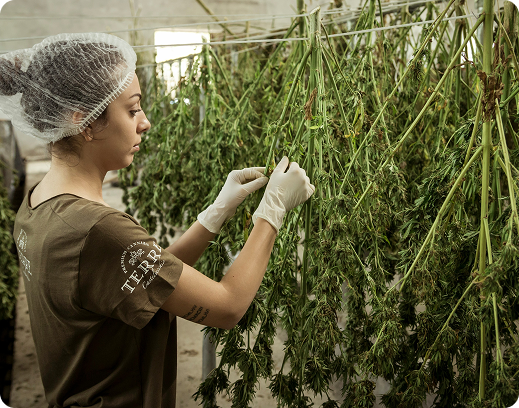How to Open a Dispensary in Arizona
Opening a dispensary in Arizona offers a promising opportunity for entrepreneurs to tap into the state’s burgeoning cannabis market. As the 15th state in the US to legalize cannabis for adult use, Arizona presents a dynamic landscape for both seasoned cannabis industry players and newcomers interested in recreational cannabis.
Here’s our step-by-step guide on how to open a dispensary in Arizona, including the crucial license application process.
Opening a dispensary in Arizona can be a lucrative business opportunity, whether you’re an experienced MSO or a first-time business owner. To help you navigate the process, we’ve put together a guide with everything you need to know.

Why Start a Cannabis Business?
Opening a dispensary offers immense opportunities:
-
High Demand
With the growing acceptance of medical and recreational cannabis across multiple states and countries, dispensaries are seeing a surge in demand. Consumers are increasingly looking for high-quality products for health, wellness, and leisure, creating a constant need for reliable, accessible dispensaries.
-
Job Creation
The cannabis industry is projected to create thousands of jobs across various sectors, including cultivation, retail, logistics, and marketing. This growth not only provides employment opportunities but also contributes to local and national economies.
-
Strong ROI Potential
Entrepreneurs who navigate the complex regulatory landscape can make big returns on their investments. With proper business planning, branding, and compliance, dispensaries can tap into a rapidly growing market with high-profit margins.
Types of Dispensary Licenses in Arizona
Arizona offers different types of licenses for dispensaries, each with specific requirements and restrictions. Understanding the different types of licenses available is important for anyone looking to open a dispensary in the state.
Dual Licensee for Marijuana Establishments
A dual licensee is an entity that holds both a Nonprofit Medical Marijuana Dispensary Registration Certificate and a Marijuana Establishment License.
A dual licensee may operate a single retail location where the licensee may dispense medical marijuana to registered qualifying patients and their designated caregivers, and sell marijuana to adults who are at least 21 years of age.

Social Equity Ownership Program
The Social Equity Ownership Program was designed to promote the ownership and operation of licensed Marijuana Establishments by individuals from communities disproportionately impacted by the enforcement of previous marijuana laws.
Social equity license holders are required to comply with all statutes and rules that govern Adult-Use Marijuana Establishment licenses, including obtaining approval to operate before opening their retail location.
Additionally, social equity license holders are required to develop and implement policies to ensure that the establishment will provide a benefit to one or more communities disproportionately affected by the enforcement of Arizona’s previous marijuana laws.
At the time of writing, Arizona is not accepting applications for social equity licenses. Be sure to check out Arizona Department of Health Services’ Social Equity Campaign web page for more information.
Application Process for a Dispensary License
Steps Involved in Obtaining a License
Obtaining a dispensary license in Arizona involves several steps, including:
- Meet the eligibility requirements: Applicants must be at least 21 years old and pass a background check.
- Create a business plan: Applicants must submit a detailed business plan, including financial projections and a description of their proposed business operations.
- Secure funding: Applicants must demonstrate that they have sufficient funding to operate the dispensary.
- Obtain a location: Applicants must secure a location for their dispensary that meets state and local zoning regulations.
- Develop a security plan: Applicants must develop a comprehensive security plan that includes measures to prevent theft, diversion, and unauthorized access.
- Submit the application: Applicants must submit their application and pay the required fees to the Arizona Department of Health Services.
- Pass inspection: Applicants must pass a rigorous inspection by the state to ensure compliance with regulations and safety standards.
- Receive the license: If approved, applicants will receive their license and can begin operating their dispensary.
The process can be time-consuming and complex, and applicants are encouraged to seek professional assistance to ensure compliance with all requirements and regulations.
Submitting Your Application
Here is a step-by-step guide to applying for a cannabis business license in Arizona
1. Create an ADHS Account: Go to the Arizona Department of Health Services online portal to create an account.
2. Gather Required Documents: Prepare the following documents
- Proof of age and residency
- Criminal background check for all owners and key personnel
- Financial statements and proof of funding
- Property lease or ownership agreement
- Local zoning compliance verification
- Business plan and standard operating procedures (SOPs)
3. Complete the Application Form: Access the application from the ADHS portal. Fill out the required details and submit it electronically.
4. Pay the Application Fee: The fee varies depending on the license type and is paid online through the ADHS portal.
5. Submit Fingerprints: Complete the fingerprinting process for background checks.
6. Wait for Approval: Once submitted, the ADHS will review your application. Processing times vary, so make sure you check your account regularly for any updates.
Please note that after issuing licenses to qualified Early Applicants and to the applicants who qualify under the Social Equity Ownership Program, the Department may not issue more than one Marijuana Establishment License for every 10 registered pharmacies in the state.

Financing and Business Plan for a Dispensary
The crucial step in getting a cannabis dispensary license is to develop a business plan, which will be used to secure the necessary financial resources. A solid business plan is one of the most essential tools in an entrepreneur’s toolkit. In general, your cannabis business plan should include the following:
- The physical location of your dispensary
- Funding plan, or the source of your startup and ongoing capital
- Sourcing plan for procuring cannabis products
- Revenue projections
- Estimate or actual number of employees
- Diversity and equity plans
- Marketing plan
- Safety and security plan
- Technology plan
- The insurance company you will be opting for
- Other relevant information you want to document
A well-crafted business plan is essential for the success of your business. It contains all the necessary information to present to potential investors and lenders, outlining the steps you will take to start and expand your business. Agencies like the Small Business Administration (SBA) can help you find funding sources from private companies or banks if you need help getting it.
Overall, while developing your business plan, ensure that you follow Arizona dispensary laws and do not include anything that goes against the rules and regulations.
Expanding Your Dispensary Operations
Expanding your dispensary operations opens up many avenues for growth—whether by launching new locations in promising markets, adding delivery services to reach more customers, or introducing private-label products and experiential offerings like cannabis lounges and educational workshops. No matter which direction you choose, strict adherence to regulations is essential, so partnering with industry experts can help navigate compliance challenges.
Additionally, securing the right insurance—covering general, product, and property liability—is key to protecting your initial investment even as you scale your business.
Location Requirements for a Dispensary
Your dispensary’s location is critical to its success. Along with ensuring that your future location is in a spot accessible to your customers with ample foot traffic, you also have to make sure that your dispensary complies with zoning laws and meets the following requirements:
- Must be located in a permanent building
- Must be separated by at least 10 miles from all other marijuana establishments
- Must be a minimum of 1,500 feet away from schools, libraries, churches, public parks, and drug or alcohol rehabilities facilities
Risk Management Plan
A risk management plan is an important component of a business plan for a dispensary. The plan should identify potential risks to the business, such as regulatory changes, security breaches, or product recalls, and outline strategies for mitigating those risks.
Effective risk management can help ensure the long-term success of the dispensary and protect the business and its stakeholders from potential financial losses. A comprehensive risk management plan should be regularly reviewed and updated as necessary to reflect changes in the business environment.
Aside from a detailed risk management plan, one important risk management strategy is insurance. Arizona marijuana establishments must carry insurance to protect their business and employees. Understanding the state’s insurance requirements can help cannabis entrepreneurs make informed decisions about their coverage needs and overall risk management.
Types of Policies Required
Currently, Arizona has no current cannabis insurance requirements. However, here are the recommended policies for all cannabis businesses to ensure that you’re protected against unexpected risks:
- General liability insurance covers bodily injury, property damage, and other potential liabilities related to the dispensary’s operations.
- Property insurance protects the dispensary’s physical property and assets, while workers’ compensation insurance covers employees in the event of work-related injuries or illnesses.
- Product liability insurance is critical for dispensaries that produce or distribute cannabis products, as it provides coverage for claims related to product defects or other issues.
- Workers’ compensation insurance is mandatory in Arizona for businesses with employees. It covers medical expenses and lost wages for employees who are injured on the job.
- Directors & Officers (D&O) insurance protects the personal assets of your company’s executives and board members in case they are sued for alleged wrongful acts in managing the company.
The coverage limits for dispensary insurance policies vary depending on the type and amount of coverage needed. Make sure to verify the specific coverage limits for your dispensary insurance policy with your insurance provider before making a purchase to ensure that you have adequate coverage for your specific business needs.
Costs Associated with Insurance
The costs associated with dispensary insurance depend on a variety of factors, including the type and amount of coverage needed, the dispensary’s location and size, and the dispensary’s risk factors.
As a result, insurance costs can vary widely, from a few thousand dollars per year to tens of thousands of dollars. Working with a reputable insurance provider and carefully assessing the dispensary’s coverage needs can help entrepreneurs find the right insurance policies at a reasonable cost.
Costs of Opening and Running a Cannabis Dispensary
The costs of opening a dispensary can be broken down into startup costs (including real estate), operating costs, and staffing costs. These three categories can vary significantly based on state and local regulations, location, size, and complexity of your operations. Common dispensary cost estimates range from $150,000 to $2 million. Below is a very rough estimate of the upfront and first-year costs of opening a dispensary:
- Application and license fees: $2,500
- Real estate costs: $125,000
- Employee salaries: $300,000/yr
- Professional fees: $50,000
- Security, hardware and software: $50,000
- Marketing costs: $100,000/yr
- Cannabis products: $1,500/lb
- GRAND TOTAL: $700,000 – $1,000,000
Ready to Launch Your Dispensary?
Opening a dispensary in Arizona takes more than passion—it requires strategic planning, a clear understanding of state regulations and federal law , and a solid grasp of the business landscape. From licensing and compliance to market research and operations, every step matters.
It’s also important to account for ongoing costs, taxes, and insurance—key factors that can impact long-term success.
While there are challenges, the opportunities are just as significant. Arizona’s expanding cannabis market and supportive social equity programs and regulatory framework make it a promising environment for new dispensary owners.
With the right team, expert guidance, and a strong foundation, you can position yourself for success in this dynamic and evolving industry. It won’t be easy—but for those willing to put in the work, it can be incredibly rewarding.
FAQ about Opening a Dispensary
Can I apply for a dispensary license if I don’t meet the qualifications for a marijuana establishment license?
Yes, there are other types of dispensary licenses available in Arizona, including medical marijuana dispensary licenses and dual licenses that allow for both medical and adult-use sales. While the qualifications for these licenses may differ, there are still opportunities for entrepreneurs and business owners to participate in the cannabis industry.
How long does it take to obtain a dispensary license?
Typically, the process can take anywhere from several months to a year or more. It is important to carefully follow all of the application requirements and deadlines to ensure a timely and successful application.
What are the regulations for advertising a dispensary?
Advertising must not be targeted at minors and must not contain false or misleading statements or claims. Dispensaries must also comply with state and local regulations regarding the placement and content of advertising materials, including online and social media advertising.
Can I have more than one dispensary location?
Yes, having more than one dispensary location in Arizona is possible, but additional licenses and approvals will be required. The state limits the number of available dispensary licenses, so acquiring additional licenses may be competitive and time-consuming.




















